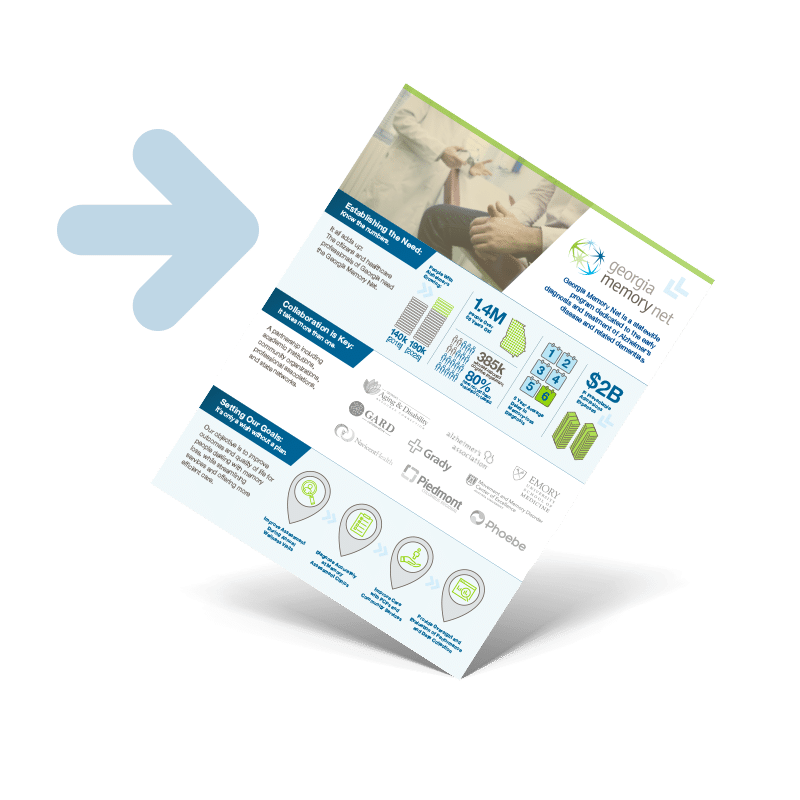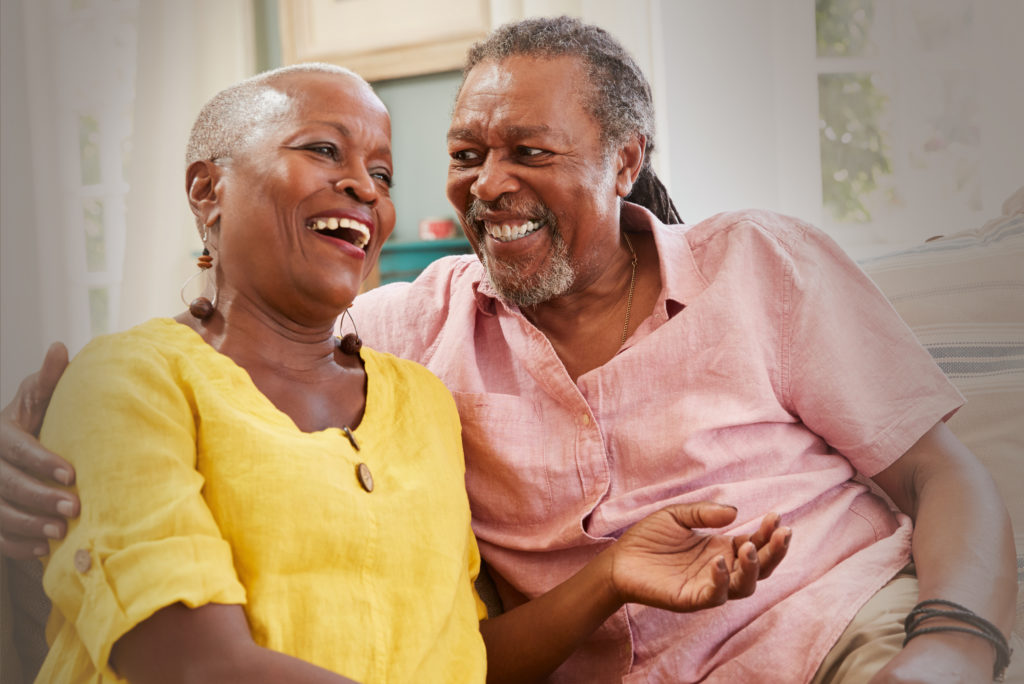Join Our Caregiving During Crisis Program
Georgia Memory Net’s parent organization and collaborators at Emory’s Goizueta Alzheimer’s Disease Research Center have released this helpful information to help support caregivers during this time of Coronavirus.
We are addressing this to all the family members and friends who provide care for persons living with Alzheimer’s disease and similar illnesses. The care you provide is always vital to the quality of life and well-being of that person. The Novel coronavirus (i.e. COVID-19) pandemic places extra burdens on you in providing that care. We want to provide you with information you can use to strengthen the effectiveness of your caregiving and assist with your own peace of mind during this time.
Some Basic Facts. The information below represents what we currently know about COVID-19. We present these facts starkly because this is a serious situation. Having good information should help you to protect yourself and your person with dementia.
Something New. Novel coronavirus—or COVID-19—is a new strain of a virus that attacks the respiratory system, but other organs as well. Because it is a new strain, very few people can resist it, no matter how hardy they may be. Our bodies haven’t seen this strain before, so our immune systems haven’t developed ways to fight it off. Also, there is, as yet, no vaccine, so no medical measures can yet be taken to protect us against it.
Serious. It is difficult at this time to have a very accurate picture, but COVID-19 appears to be a serious disease threat. The Centers for Disease Control and Prevention (CDC) include, in their range of possible futures for the illness, a prediction that more than half of the US population could be infected. The illness appears to have more serious outcomes than the flu, and death rate predictions are higher.
Risk Factors. COVID-19 requires the body’s immune system to mount a response to fight it off. According to the World Health Organization, anyone who has a weak immune system is at risk not only for acquiring the illness but is vulnerable to becoming severely ill with the virus. Two factors are associated with weakened immune response: age and underlying chronic conditions. Those over 60, and especially those over 80 (even those who seem fit), are at higher risk for acquiring the illness. Also, smokers and individuals with chronic conditions like cancer, lung disease, diabetes, high blood pressure, and heart disease are at increased risk for COVID-19.
Points of Entry. The illness enters the body through the nose, eyes, or mouth and then proceeds to the lungs. This is why we are advised to avoid touching our face. It may also enter through particles in the air. This is why social distancing and avoiding crowded situations are recommended.
Alzheimer’s and COVID-19. The person for whom you provide care is in a high-risk situation. Most persons living with Alzheimer’s are over the age of 65 (one risk factor), and most persons over 65 have at least one, and typically more than one, chronic illness (the other risk factor).
The CDC website is an excellent source of reliable information: https://www.cdc.gov/coronavirus/2019-ncov/index.html
Local Health Department Numbers can be found here: https://www.cdc.gov/coronavirus/2019-ncov/downloads/Phone-Numbers_State-and-Local-Health- Departments.pdf
Guidance for Caregiving. We recognize that we are relatively early in this outbreak and that information and guidance is coming out in an ongoing way, so the guidance we are providing is guidance for now. Follow these general rules to protect you, the person you care for, and your family.
General Rules. Please follow these rules even if you or your person has not been diagnosed with COVID-19 or neither of you is showing signs of it.
Self-Care. The best protection for you and those you care for is for you not to acquire the virus. Do your best to stay healthy. Take your medications as prescribed and follow your exercise and rest programs.
Handwashing and Sanitizing. If you leave the home, always wash your hands when you return and frequently during the course of the day. Cleanse hands for at least 20 seconds (sing Happy Birthday twice). Use hand sanitizer often. Use hand lotion to prevent drying and cracking of skin.
Do Not Shake Hands. Avoid direct skin-to-skin physical contact. Wave; nod; bow; give the peace sign. But don’t touch. Do an elbow bump, if you’re both in sleeves. And fist bumps? That’s skin-to-skin, too. So don’t.
In Your Home. Clean surfaces in your home using the CDC’s recommended solution of 4 teaspoons bleach per quart (4 cups) of water. Clean door knobs, sink handles, refrigerator and oven doors, steering wheels, and other high-use surfaces daily. Change hand and kitchen towels daily. Open windows (if possible) to increase ventilation. Do not share dishes and utensils.
Manage Underlying Chronic Conditions. Chronic conditions, such as diabetes, heart disease and COPD tax the immune system. Adhere to management regimens to prevent the condition from worsening. Ask providers to call in refill orders and see if the pharmacy can deliver—or has a drive through pickup window. Do this for the medications that both you and your care-recipient take.
Monitoring. Watch yourself and your person for symptoms (fever, cough, sore throat). Take your temperature occasionally.
Social Distancing. Remove yourself and your person from close contact with groups of people. This is admittedly very difficult, so here are some thoughts:
- If you are working outside the home, see if it is possible to work at a distance through telecommuting means (phone and videocall contact, etc.)
- Examine patterns of social interactions: If you regularly attend worship services, see if your place of worship offers streamed services, or consider using the regular time of attendance as a time of home worship.
- If you take your person shopping or to malls, reconsider. If you must, perhaps use smaller shops at off-hours, and avoid very crowded places. Call friends, family, or neighbors to see if they are going to the store and can pick up items you might need.
- Think about outings that present minimal risks: going to large parks, taking walks.
- Limit going out to restaurants‚ or stop altogether. If you cannot stop going to restaurants, call ahead (or look online or on the restaurant’s app) to order take out and see if they can deliver curbside.
- Here’s a really hard one—family visits: Keep them small—one or two people at a time. Ask everyone who feels unwell, has come into contact with people with the virus, or has any symptoms to stay away. Ask all others to follow the same safety rules you are (wash hands). No grandkid visits.
- Do not Shake Hands. Avoid direct skin-to-skin physical contact. Wave; nod; bow; give the peace sign. But don’t touch. Do an elbow bump, if you’re both in sleeves. And fist bumps? That’s skin-to-skin, too. So don’t.
More Home Engagement Opportunities. If you have relied on outings—like those listed above—as a way to keep your person pleasantly occupied during the day, then removing them from the schedule means you have to fill in those times with other engaging tasks and activities. So, plan for that. Consider the kinds of at-home activities that seem to please and engage your person. Are there ways to repeat such activities over the course of a day? Are there similar kinds of activities you might try (if the person enjoys helping with cooking, might s/he enjoy helping with the laundry)? Try new things out and add those to your toolbox that you see to be working well.
Pay Attention to Your Own Isolation. If following the “rules” means you are finding yourself more homebound, be sure to check to see how this is making you feel. Take some preventive steps before you begin to feel a sense of being isolated. Make arrangements with family, neighbors and friends to have regular contact. Phone and FaceTime calls can be helpful. If you do take walks with your person, invite another person along. If a friend or family member can come in to be with your person for brief periods of time, seek and accept that help, and take yourself for an outing—observing all the rules when you return (and also the advice about having help come in).
Help from Outside the Home. If you have someone coming into the home to help care for your person, then the general rules should apply to them as well. The person should adhere to hand washing rules, be urged to follow good self-care procedures, and monitor him/herself for symptoms of COVID-19. If a home health care worker comes to your home and also visits other homes, ask to review the procedures she or he has in place to prevent the spread of COVID-19 to their clients.
Medical Care. You are very likely in a position where you have to manage your person’s routine and chronic health care as well as to respond to changes in condition or react in an emergency situation. It’s important to recognize that, with COVID-19, you need to have a plan for how to handle some medical situations that might arise in the course of caregiving.
Primary care providers (nurse practitioners, physicians, physician assistants) can bill for telehealth with Medicare and Medicaid patients. So, call the office and see if they have put procedures in place for handling—through a phone call or a video call—routine visits and visits related to any concerns you may have. If they don’t, ask for advice about:
- Handling routine and chronic care situations that you’d usually manage by bringing the person to the office.
- Dealing with possible COVID-19 symptoms.
- Responding to emergency situations—should you call the office first? Go directly to an Emergency Department?
If you feel you have an emergency, but are not sure, and cannot get through to your primary care provider, call your local Emergency Department. Most have a nurse or physician on duty who can offer advice about the need to come in immediately or wait at home.
If you think you or your person might be showing signs of COVID-19 and think you should be tested, it’s important to call your primary care provider (or the Emergency Department or your Health Department) first. They may be able to provide advice about whether you need to be tested immediately or if it is appropriate to wait. If you do need to be tested immediately, they may also be able to direct you to the appropriate testing location. In many areas of the country, the clinic office or Emergency Department may not be where you can get tested, and testing sites may need a provider’s referral before they will test you.
If you and/or your person are participating in a research study, call your research coordinator for current information. Some studies have been put on hold; others may have moved to enable contact at a distance (e.g., by phone).
If Your Person is Living in an Assisted Living or Skilled Nursing Facility. It is increasingly likely that visitors, even close family, will not be permitted to visit relatives in such facilities.
See if the facility can help you to make contact by a distance. Can they help put a phone call through? If the facility has WiFi and if you have an extra phone or tablet computer (iPad), will they help the person to use it when you call so the person can see your face.
The staff will continue to provide care and comfort, but you will not be able to have in-person time with the person that may be important to you. If you are alone and feeling this as yet another loss, take action. Try to go out for a walk, call family and friends, listen to your favorite music, look at scrapbooks or read a good book. If you belong to a church or synagogue, call and ask to be put on a prayer list. Many religious staff are working from home and can respond to your messages. Have family and friends mail cards and letters to them.
Georgia Memory Net at a Glance
What is Georgia Memory Net and why does it exist? There’s so much information about Alzheimer’s and related dementias in Georgia, and how to diagnose and treat them, that it can become overwhelming. We’ve done our best to simplify the info into a clear one-page infographic.



